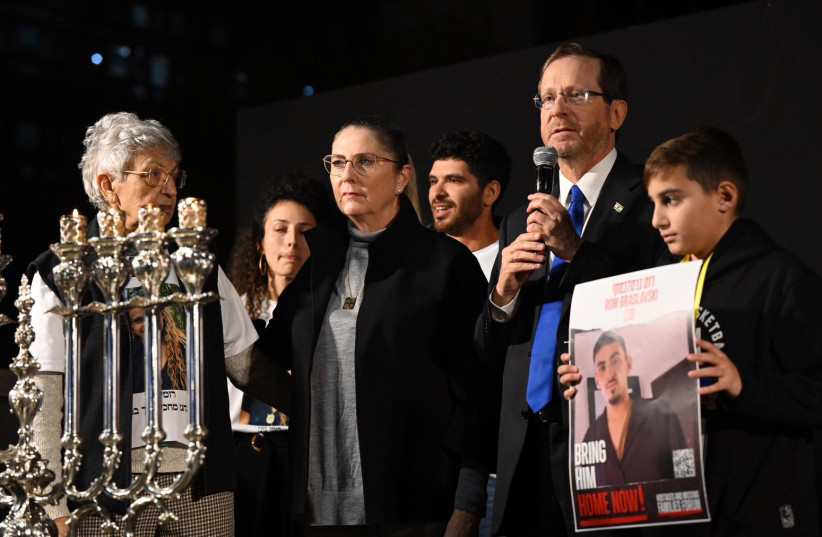This week marks our four-month anniversary as olim hadashim (new immigrants). Our days have been full, between adjusting to our new surroundings (including the various safe rooms and bomb shelters, sadly) and dealing with bureaucratic details such as obtaining our temporary Israeli passports, which we did last month.
During our first Hanukkah in Israel as Israelis, we tried to participate in several public events.
At Independence Square in Netanya on the fifth night of the festival, there was a candle lighting followed by a speech by Netanya resident and neighbor Ruby Chen, father of fallen soldier Itay Chen, z”l, whose body is still being held in Gaza. The Chens had believed that their 19-year-old son Itai was being held captive until they were tragically informed otherwise.
A native of Netanya, Itay’s beautiful face is posted large with the ubiquitous “Bring Them Home” message all over Ramat Poleg, where we’ve been living since our arrival. Despite his unimaginable grief, Ruby spoke without anger or bitterness, inspiring us all with his message of unity and the importance of standing together as a nation to bring everyone home, living or deceased, from this war and from prior wars.
On Shabbat Hanukkah, we visited Jerusalem, praying in the shul where Rabbi Avi Goldberg, z”l, was hazan. A father of eight, Rabbi Goldberg was a rabbi, teacher, musician, and community leader. He has been described by members of his community as an angel and “a living beacon of light.” He voluntarily left his family to join his combat unit in battle because he believed in the righteousness of defending the Jewish people in our homeland.

Living in Israel, one feels surrounded by true greatness: the greatness of these holy people who sacrificed their lives so that we may live in this land and the greatness of those who live on to mourn their loved ones.
Indeed, I marvel to be surrounded by these modern-day Maccabees fighting age-old battles. Though I didn’t know these kedoshim (holy martyrs) personally, I feel a sense of deep connection by virtue of the simple fact that I have prayed in their synagogues. That’s how close one feels here in this small nation.
The collective pain we feel in our hearts for their loss and for the suffering of their families is piercing. Nevertheless, in the face of such overwhelming loss, one can’t help but be struck by the tremendous spirit of unity and hope that permeates this tiny nation.
Songs of excitement
Amid such sorrow and heaviness, a song has emerged that perfectly embodies our collective resilience and belief in better days ahead. Both the music and the lyrics are overwhelmingly contagious, generating excitement and positivity everywhere the song is sung. Called “Tamid Ohev Oti,” meaning “God always loves me,” its energetic refrain crescendos with the words “od yoter tov,” which translates as “even better.”
Although the song is written in the first-person singular, everyone who hears it knows that it is all about the “first-person plural” here in our beleaguered nation, consistently under rocket fire from our enemies near and far as well as criticism from our friends close and distant. The song is not just a prayer for God to send goodness to His people; it is a confident declaration on behalf of His people that better days are surely ahead.
The song was belted out live at a candle lighting and dance party in honor of the eighth day of Hanukkah at the Mamilla outdoor mall. The yeshiva boys and seminary girls crowding the plaza were jumping up and down as if at the wedding of their best friends. The excitement was palpable.
The song also spontaneously erupted in my classroom last week at Reichman University after a Chabad emissary entered my class on the sixth night of Hanukkah with candles to light and sufganiyot to share.
My students joined in singing “Maoz Tzur,” immediately followed by choruses of “od yoter tov” because this has become the mantra here, perhaps even the national anthem of our times: The future will be even better than we can imagine.
After one of the darkest times in Jewish history and arguably the darkest year in Israeli history, we are confident that the future will be bright.
Even though the darkness is not over with the hostages still in dungeons and our soldiers still in danger after 400-plus days of war, we, as a nation, have no choice but to believe in the light. And as a new immigrant, I am proud to stand with my new country and its people in this unwavering faith that life will only be “od yoter tov.”
The writer is a recent new immigrant from Houston. Formerly a professor of English as a second language to international students at Houston Community College and University of Houston, she is currently a lecturer of English at Reichman and Bar-Ilan universities.
